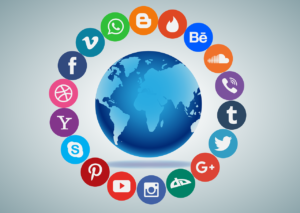
Social beings on social media
The emergence of social media communications can enhance research dissemination opportunities within and beyond the scientific community. If the philosophers’ argument that human beings are social beings is true, then social media can be seen as a respond to the human urge for socializing. Since its dawn, the Internet has always been a critical tool in human interactivity and given the current trends in social media that interactivity is thus increasing.
Traditionally, when you interacted (offline) with family and friends as a researcher or scientist, once in a while you might find yourself discussing your work. Today, on the Internet and through social media you can interact with many more people and certainly, you can tell them about your exciting research work.
It is not an understatement to say that social media on the one hand is revolutionizing the communications industry. Social media channels, not just Facebook and Twitter (aka the obvious suspects) are increasingly gaining popularity among the public and more often are playing an integral role as communication tools. But there are many researchers and scientists who still shy away from social media, particularly Facebook and Twitter.
These days, social media waits for no one. If you’re LATE for the party, you’ll probably be covered by all the noise and you might not be able to get your voice across. It could only mean that if you want to be heard by the crowd, you have to be fast; and on social media, that means you have to be REALLY fast.” Aaron Lee, a top social media influencer.
I have met quite a number of researchers and once I hear about their research work I will rush to Twitter to find and follow them. More often than not, I am disappointed to know that they are not on Twitter. As a journalist, I have participated in live tweeting at various conferences/seminars and whereas most activists and other professionals can be easily found on social media, most researchers barely have a private Facebook account. But what is more striking is that those on social media, especially Twitter receive a lot more attention and engagement (primarily because they have audience both online and offline). So why should many researchers and scientists still focus on traditional means of research dissemination?
You have more chances to be heard
But with the increasing prevalence of social media, researchers and scientists should be fast adapting to using this not-so-new anymore new media tools. From Facebook to Twitter, WordPress to Youtube, among others, more and more researchers should opt to use social media channels for research dissemination. Of all the aspects of research impact, it is evident that visibility is very essential. A research by World Bank economists on the impact of economics blogs on research papers on economics found a significant correlation between blogging and increased in downloads.
It is common sense that people can only read your research if they know about it (if it is visible to them). And it has been established beyond any reasonable doubt that wide sharing of academic articles, especially through social media increases their visibility (and eventually downloads). Social media, more than any other tools offers the greatest chances for visibility if properly utilized. Twitter has over a quarter billion (about 310 million) active monthly users while Facebook reportedly has over 1.5 billion active monthly users. You cannot find anywhere else a larger population spanning peoples from across the globe with varied backgrounds and interests.

Some argue that social media is full of trolls and thus a “no go” area for serious business such as scientific research. The premise of this maybe true but the fact that social media is “full of trolls” is not a good enough reason to avoid it. On the contrary, social media is actually what you make it. The fact remains that there are trolls even in our scientific publishing world but as serious scientists we either ignore the trolls or as even better scientists we turn the trolls into serious conversations. Thus in conclusion, if you haven’t joined the conversation on social media yet, this should be a wake-up call. And if you’re already here, look out for how to improve on what you are doing.